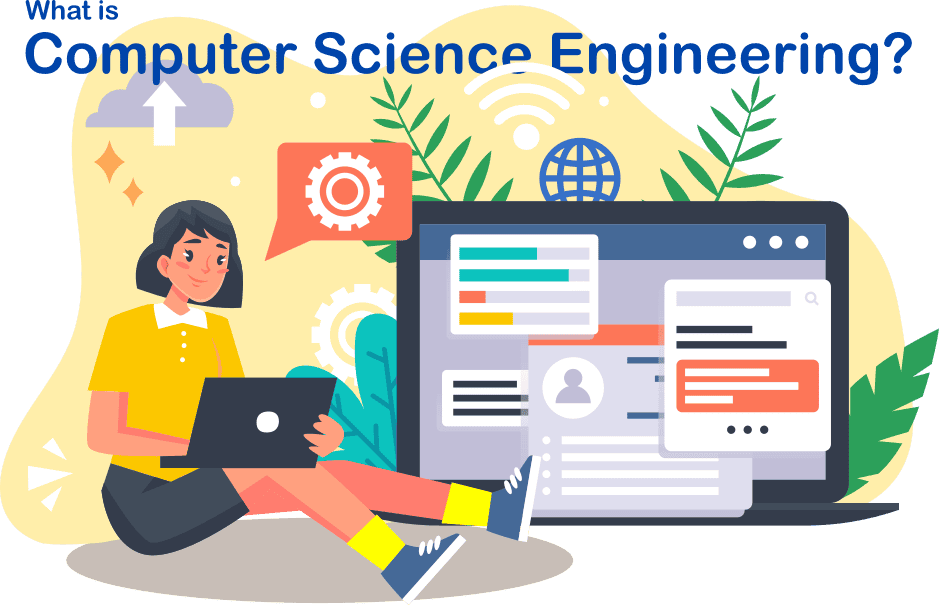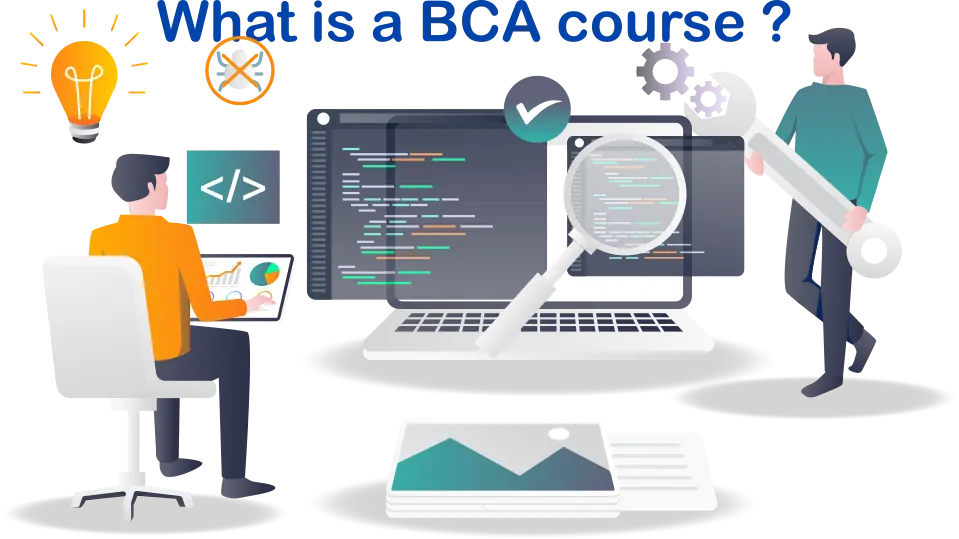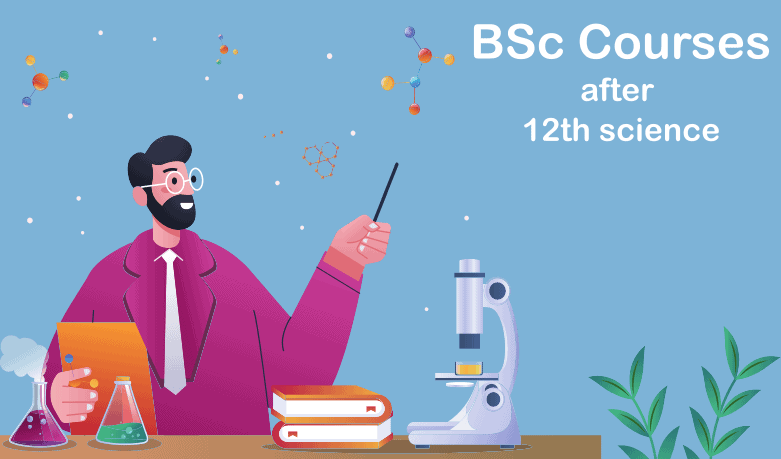Computer Science courses are all about Information systems that involve planning, configuring and managing hardware and software operations. Multiple programs in computer science are available for undergraduate and graduate study, but we are specific to computer science engineering courses in this article that include BE, BTech, and M.Tech degrees. We have curated this article to answer the common question: what is computer science Engineering? What are the different courses for becoming a computer science engineer?
Computer science graduates can find various entry-level jobs in the software and IT industries. Students who enrol in computer engineering courses are learning major subjects such as data structures, database management, programming, and computer architecture. We will cover all the details of computer engineering courses, including syllabus, fees, scope, colleges, and salaries.
What is Computer Science Engineering? Their impact on society
CSE’s full form is Computer Science Engineering. Computer science engineering is about computational systems theory and programming. Universities designed the curriculum to impart knowledge on programming, algorithms and data structures, computer architecture, operating systems, computer networks, and database systems.
Computational theory includes theory of computation, numerical methods, machine learning, data science, and artificial intelligence. Given that it’s one of the industries with the fastest growth, a career in computer science could lead to satisfying work. A job in computer science can be ideal for you if you enjoy learning about new technologies, coding, and solution-finding.
Importance of Computer Science Engineering:
Computer science and technology affect every facet of life, including finance, communications, transportation, healthcare, and scientific research. In the modern economy, almost every type of business, organisation, and industry depends on technology and computer systems to thrive.
Professionals in computer science roles carry out the following vital activities to keep an organisation running:
- Investigating how computers and computing technology affect people individually, in groups, and society
- Building software systems with varying degrees of complexity, as well as keeping them updated
- Creating and evaluating processes and systems based on computers
- Using technical methods to solve complicated problems
Courses in computer science engineering
Diploma in computer science engineering:
A three-year diploma degree in computer science engineering covers computer science, mathematics, computing techniques, and engineering principles. After passing 10th grade, students can choose to enrol in a Computer Engineering program. As they progress through the program, students gain competencies that prepare them for careers in IT. Many polytechnic institutes provide Computer Science diploma programs that last three years.
The diploma course admits students based on merit and entrance examination results. Nonetheless, before admitting students, certain establishments may conduct interviews. Learning in the domains of engineering, science, computers, technology, etc., is the primary focus of diploma programmes in computer science and engineering.
UG – Btech and BE in Computer science and engineering:
Candidates who have finished their 10+2 education with a background in Physics, Chemistry, and Mathematics are eligible to apply for the four-year BE or BTech (different universities name the curriculum either BE or Btech; it’s more or less the same) in Computer Science and Engineering (CSE) program. The program frequently includes industry-relevant projects and internships to give industry experience. Students get practical learning in system design, database management, and web programming.
Computer science engineering courses give opportunities to enter the software industry as a programmer, system analyst, IT consultant, and many more positions. The CSE program is industriously crafted to yield well-rounded professionals capable of meeting the ever-changing demands of the IT sector. Every undergraduate BE and BTech computer science and engineering course offers a choice of major fields and core topics with electives.
UG – Btech and BE in INFORMATION TECHNOLOGY
Students have the option to choose four four-year BE and Btech in information technology engineering apart from computer science engineering. The information technology engineering course mostly focuses on server-side operations, SQL and Database management.
IT professionals are required in industries to install computer systems, manage software, and maintain networks and databases. As part of their skill set, they navigate the complexities of many operating systems and server software, such as Linux-based environments, Apache servers, Microsoft ecosystems like Windows Server, Oracle, MySQL, and Microsoft SQL Server, and cryptographic protocols like OpenSSL. IT workers need to stay current on innovations across multiple areas to handle the evolving difficulties inside this dynamic technology world properly.
Difference between IT and computer science
Now, you must be wondering about the difference between IT and computer science. Well, IT is the new branch of study compared to CSE. Only some colleges offer 4-year IT engineering courses compared to CSE. For example, out of 31 NITs, 6 NITs offer Btech in Information Technology. Although both courses are industry-specific, there is a fine difference between them. Let’s find out.
| Computer Science Engineering | Information Technology |
| The use of mathematics in system programming makes systems operate more effectively. | The main goals are to install, maintain, and improve databases, networks, and computer systems. |
| Its main objectives are to build computer systems and write programming codes that guarantee a computer can execute a program. | It addresses how to manage computers in an organization and ensures that critical IT systems are managed. |
| Candidates with a CSE degree can work as web developers, data analysts, applications software developers, and coding associates. | Those who have completed an IT course may choose to work as network architects, system administrators, database administrators, cybersecurity and IT support. |
| Graduates of CSE programs have specialities in data mining, artificial intelligence, embedded systems, computational science, and writing programs. | Software such as Linux, Apache, OpenSSL, Windows Server, Oracle, MySQL and Microsoft SQL Server, knowledge of networking protocols are the areas of expertise for IT specialists. |
Mtech and ME in Computer science
The length of a master’s program in computer science is two years, split into four semesters. The focus will be on application because Mtech is a more application-based degree. The program covers variety of theoretical and practical areas in your studies. Here are a few of the main areas of specialisation you may encounter in MTech in computer science:
- Artificial Intelligence (AI) and Machine Learning
- Data Science and Big Data Analytics
- Information security and Cyber Forensics
- Computer Science and Engineering
Eligibility Criteria
Diploma
The qualifications for a diploma in computer engineering vary between colleges and universities. Students need to pass grade 10 with at least 40 % or 50% marks (depending on the university).
Undergraduate
The prerequisites for a computer science degree ( BE or BTech ) may differ depending on the university. Admission to certain universities is determined by a student’s merit score from their 10+2 class. In contrast, entrance exam screening criteria are popular among top colleges and universities to assess a student’s candidature. Nonetheless, the eligibility requirements for students to be eligible for computer science programs vary with the exam and Universities:
- Candidates must have successfully passed their 10+2 PCM and completed a three-year diploma.
- There are no percentage criteria for JEE; however, VITEE and BITSAT have minimum marks criteria of 60 % and 75 % in Physics, Chemistry, and Mathematics, respectively.
- There is no age limit for exams (however, institutes might have the age criteria).
Postgraduate
Depending on the branch, area of specialisation, and educational background, different requirements apply to postgraduate computer science degrees. Below are some typical qualifying requirements that are taken into account when admitting students to computer science postgraduate degree programs:
- To pursue a postgraduate degree in computer science, students must complete their bachelor’s degree in computer science.
- For VIT, there is a requirement of a minimum mark, that is, an aggregate of 60 % in bachelor’s.
Entrance Exams
For Diploma
For government polytechnic colleges, the state government conducts entrance exams for admission to the Diploma programs. In Private colleges, students can get admission through merit.
Undergraduate
One needs to pass several entrance exams to pursue degrees in computer science and engineering. These entrance tests help the candidate pursue a range of undergraduate and graduate engineering degrees at the universities of their choice. Listed below are some of the most challenging admission exams for Indian undergraduate computer science programs:
JEE Main: The entrance test for computer science programs is one of the most popular ones. This is an online computer exam that is conducted nationwide in around 360 cities throughout five different countries (not including India).
JEE Advanced: JEE Advanced is another entrance exam that the NTA administers to grant admission to several engineering and computer science programs, among other relevant programs. Applicants who wish to study engineering at prestigious Indian colleges like the IITs and NITs must take this exam.
BITSAT: Birla Institute of Technology and Science Admission Test is known as BITSAT. BITS Pilani offers this engineering entrance exam as one of the requirements for on-campus admission.
SRMJEE: The abbreviation for the SRM Joint Engineering Entrance Examination is SRMJEE. Students need to clear the SRMJEE exam to get admission to different BTech degree specialisations, including computer science.
UGEE: Students must clear the UGEE (Undergraduate Entrance Examination) to get admission in a dual degree program at IIITs. The BTech and Master of Science by Research degrees are awarded to graduates of these programs.
VITEEE: For admission to undergraduate engineering degrees in the VIT group of institutions, the Vellore Institute of Technology Engineering Entrance Examination (VITEEE) is administered.
Postgraduate
There is just one national entrance exam for the top postgraduate admissions process, the Graduate Aptitude Test in Engineering, or GATE. Numerous institutions may hold their entrance examinations. The following list includes the best entrance exam in India for those wishing to enrol in a postgraduate computer science programme:
GATE: An IIT administers the Graduate Aptitude Test in Engineering, or GATE, as a postgraduate entrance test to grant admission to various IITs, NITs, and GFTIs.
CUET PG: The Central Institutions Common Entrance Test (Postgraduate), or CUET PG, is a joint entrance exam to gain admission to postgraduate programmes in central institutions in India.
PGEE: IIIT Postgraduate Entrance Examination stands for the International Institute of Information Technology. IIIT Hyderabad administers this entrance exam for admission to MTech, MS, and PhD degrees.
VITMEE: The Vellore Institute of Technology Masters Entrance Examination, or VITMEE, is held annually to admit students to postgraduate M.Tech/MCA programs offered at the VIT campuses in Andhra Pradesh, Bhopal, Chennai, and Vellore.
Scope of computer science and engineering
Computer science and engineering scope have a wide range of applications because:
- New hardware and software: As technology develops, the world becomes immobile in the absence of novel gadgets. For this reason, there will be a huge demand for those with extensive computer science expertise.
- IT hubs need experts: As time goes on, the number of software firms and IT centres like Silicon Valley rises, which in turn raises the need for CSE specialists and other talented workers.
- Cloud computing experts: Most businesses are searching for a specialist who can handle the whole cloud computing segment and aid in the growth of the firm, as future technologies rely on concepts like cloud computing.
- Employment in telecommunications: The telecommunication industry hires computer science engineers since telecommunication networks depend on computer services due to the rise in digitalisation.
- Transportation services: Computer science engineers are desperately needed in the transportation sector due to the resurgence of GPS services.
- The computer manufacturing unit: Only computer science engineers are capable of creating computers most efficiently. There’s a good reason why the majority of the top Fortune 500 computer manufacturing firms anticipate employing an increasing number of highly skilled computer science engineers.
- Software engineers are those who apply their fundamental understanding of computer science engineering to the design, development, management, and implementation of computer application that solves problems in the information technology area. Any software developer might start out making between INR 4 lakh and INR 6 lakh.
- The role of an IT administrator, also known as a system administrator, is to set up, upgrade and maintain computer systems so that all multi-user computers can operate smoothly. An IT administrator often makes between INR 3 lakh and INR 5 lacs.
- The mobile application developer’s job is to write software that runs on smaller platforms, such as mobile phones, so that users may access it from anywhere at any time. Any mobile application developer may expect to start out making between 3.5 and 5.5 lakhs of Indian rupees.
- DevOps Engineers deliver top-notch services by leveraging DevOps procedures, tools, and techniques. They are qualified to implement Continuous integration and continuous delivery (CI/CD) to automate and optimise the application lifecycle. A DevOps developer’s starting pay ranges from INR 5 lakh to 6 lakh.
- Software testers’ primary responsibility is to closely monitor newly developed software to ensure it meets quality standards. Their starting pay ranges from INR 3 lakh to INR 5 lakh.
- Full Stack Developer is responsible for backend and frontend development of web applications. A full-stack developer often makes between INR 5 lakh and 6 lakh at first.

Top colleges and their fees
Deemed Universities and other Institutes of Eminence are among the best private and government institutions. They offer excellent placement prospects and industry connections to help recent graduates get off to the ideal start. The list mentioned below includes a few well-liked private & government universities where the best computer science engineering colleges in India along with computer science engineering fees:
| Name of the College | Fees in INR per Annum |
| Amity University,Noida | INR 3 lakh |
| Manav Rachna University, Faridabad | INR 2.5 lakh |
| REVA University, Bangalore | INR 3 lakh |
| IIT Kanpur | INR 2 lakh |
| BIT Durg | INR 3 lakh |
| CVR College of Engineering | INR 1 lakh |
| HITS Chennai | INR 3 lakh |
| Amrita School of Engineering, Coimbatore | INR 3.35 lakh |
| Lovely Professional University, Jalandhar | INR 2.5 lakh |
Salaries of Computer Science Engineers
Typically, computer science engineers have many opportunities to locate positions with higher benefits and compensation. Following completion of the four-year degree in computer science and engineering, candidates can anticipate starting salaries between 3 and 7 lakh rupees per year.
Software engineers in product-based companies such as Facebook(Meta), Amazon, Apple, Microsoft, and Google earn huge salaries. A fresher in such a company gets more than 30 lakhs per annum, and a few experienced software engineers easily earn more than 50 lakhs per annum.
The salaries data are taken from ambitionbox; hence, they can vary.
Conclusion
Some of the best benefits of working in the field of CSE engineering include high compensation, creative and demanding work patterns, and a never-ending learning curve.
However, there are several drawbacks to any stream, such as the occasional monotony and the possibility of long, exhausting workdays. One of those without which academia and business would have collapsed is computer science and engineering. Undoubtedly, it is highly desirable by young people.
If you liked the content, we recommend you share it with your friends and families. There are other relatable contents available for you so do check them.




